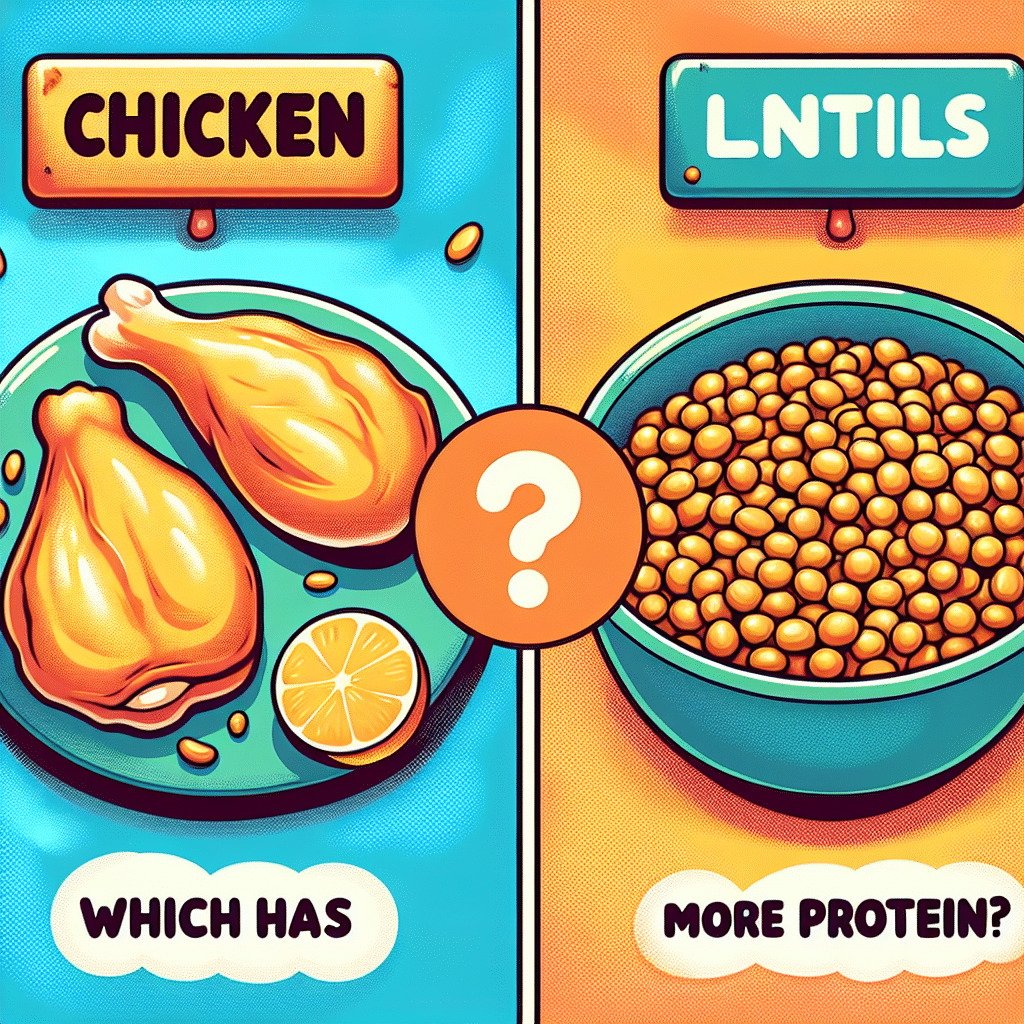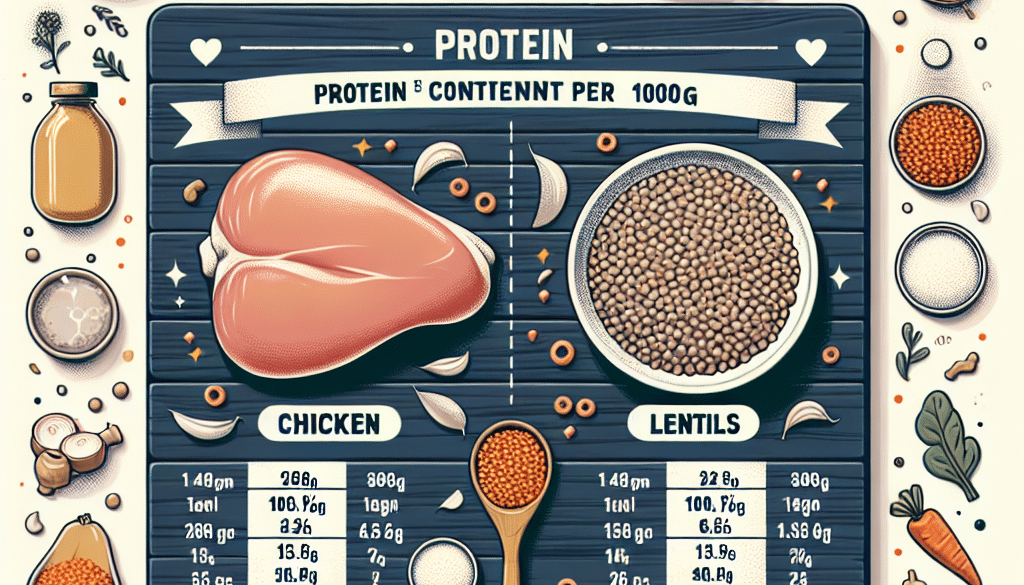What Has More Protein Chicken Or Lentils?
-
Table of Contents
- Chicken vs. Lentils: A Protein Comparison
- Understanding Protein Content
- Protein in Chicken
- Protein in Lentils
- Comparing Chicken and Lentils
- Nutritional Benefits Beyond Protein
- Environmental and Ethical Considerations
- Practical Tips for Incorporating Chicken and Lentils into Your Diet
- Conclusion: Balancing Protein Sources for Optimal Health
- Discover ETprotein’s High-Quality Protein Products
Chicken vs. Lentils: A Protein Comparison

When it comes to dietary protein, there’s a common debate between animal and plant sources. Two popular options that often come up in this discussion are chicken and lentils. Both are known for their high protein content, but which one offers more? This article delves into the nutritional profiles of chicken and lentils, comparing their protein content and discussing the benefits and considerations of each.
Understanding Protein Content
Protein is a macronutrient essential for building and repairing tissues, making enzymes and hormones, and supporting overall health. The Recommended Dietary Allowance (RDA) for protein is 0.8 grams per kilogram of body weight per day for adults, though this can vary based on age, sex, and level of physical activity.
Protein in Chicken
Chicken is one of the most popular sources of animal protein. It’s lean, versatile, and widely available. The protein content in chicken can vary depending on the cut. For example, a 100-gram serving of cooked, skinless chicken breast contains about 31 grams of protein. This makes it an excellent source of complete protein, containing all nine essential amino acids that the body cannot produce on its own.
Protein in Lentils
Lentils are a staple in vegetarian and vegan diets, known for their high protein and fiber content. A 100-gram serving of cooked lentils provides about 9 grams of protein. While lentils contain a significant amount of protein for a plant-based food, they are not a complete protein source, as they lack sufficient amounts of certain essential amino acids.
Comparing Chicken and Lentils
When directly comparing the protein content of chicken and lentils by weight, chicken comes out on top. However, it’s important to consider the broader nutritional context:
- Chicken provides more protein per serving but also contains cholesterol and saturated fat, which should be consumed in moderation.
- Lentils offer additional nutrients like dietary fiber, folate, and iron, and are naturally cholesterol-free.
- Combining lentils with other plant-based proteins, such as rice, can create a complete protein with all essential amino acids.
For those looking to increase their protein intake, chicken is a more concentrated source. However, for individuals following a plant-based diet or those looking to reduce their intake of animal products, lentils are a valuable protein option.
Nutritional Benefits Beyond Protein
While protein content is a significant factor, it’s not the only nutritional aspect to consider when choosing between chicken and lentils:
- Chicken: Besides protein, chicken is a good source of B vitamins, particularly niacin and vitamin B6, which are important for energy metabolism and brain health.
- Lentils: Lentils are rich in complex carbohydrates, soluble fiber, and minerals like potassium and magnesium. They can help with blood sugar control and may reduce the risk of chronic diseases.
Environmental and Ethical Considerations
Choosing between chicken and lentils isn’t just about nutrition; environmental and ethical factors also play a role:
- Animal agriculture has a larger environmental footprint than plant-based agriculture, contributing to greenhouse gas emissions, water usage, and land degradation.
- Plant-based proteins like lentils require fewer resources to produce and are considered more sustainable.
- For those concerned with animal welfare, lentils offer a cruelty-free protein alternative.
Practical Tips for Incorporating Chicken and Lentils into Your Diet
Both chicken and lentils can be part of a balanced diet. Here are some tips for including them in your meals:
- Choose skinless chicken cuts and prepare them using healthy cooking methods like grilling, baking, or poaching.
- Experiment with lentil-based dishes such as soups, stews, salads, and veggie burgers.
- Mix lentils with grains or other plant proteins to ensure you’re getting all essential amino acids.
Conclusion: Balancing Protein Sources for Optimal Health
In conclusion, while chicken provides more protein per serving than lentils, both are valuable sources of this essential macronutrient. Chicken is a complete protein suitable for those looking for a high-protein option, while lentils offer a plant-based alternative with additional health benefits. Considering your dietary preferences, health goals, and environmental impact can help you make the best choice for your needs.
Discover ETprotein’s High-Quality Protein Products
If you’re looking to supplement your diet with high-quality protein, ETprotein offers a range of organic bulk vegan proteins that cater to various dietary requirements and preferences. Their products, including organic rice protein, pea protein, and more, are non-GMO, allergen-free, and feature a neutral taste, making them an excellent addition to any diet.
About ETprotein:
ETprotein, a reputable protein and L-(+)-Ergothioneine (EGT) Chinese factory manufacturer and supplier, is renowned for producing, stocking, exporting, and delivering the highest quality organic bulk vegan proteins and L-(+)-Ergothioneine. They include Organic rice protein, clear rice protein, pea protein, clear pea protein, watermelon seed protein, pumpkin seed protein, sunflower seed protein, mung bean protein, peanut protein, and L-(+)-Ergothioneine EGT Pharmaceutical grade, L-(+)-Ergothioneine EGT food grade, L-(+)-Ergothioneine EGT cosmetic grade, L-(+)-Ergothioneine EGT reference grade and L-(+)-Ergothioneine EGT standard. Their offerings, characterized by a neutral taste, non-GMO, allergen-free attributes, with L-(+)-Ergothioneine purity over 98%, 99%, cater to a diverse range of industries. They serve nutraceutical, pharmaceutical, cosmeceutical, veterinary, as well as food and beverage finished product distributors, traders, and manufacturers across Europe, USA, Canada, Australia, Thailand, Japan, Korea, Brazil, and Chile, among others.
ETprotein specialization includes exporting and delivering tailor-made protein powder and finished nutritional supplements. Their extensive product range covers sectors like Food and Beverage, Sports Nutrition, Weight Management, Dietary Supplements, Health and Wellness Products, and Infant Formula, ensuring comprehensive solutions to meet all your protein needs.
As a trusted company by leading global food and beverage brands and Fortune 500 companies, ETprotein reinforces China’s reputation in the global arena. For more information or to sample their products, please contact them and email sales(at)ETprotein.com today.












